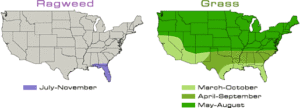
Living With Allergies
Allergy Management Tips & Myths
-
Seasonal symptoms does not necessarily mean you have seasonal allergies.
To really understand your symptoms and their causes, it is best to undergo allergy testing to both determine the cause and the best treatment modality. Spring allergy symptoms could be tree pollen or they could just as easily be mold allergies, which can be a year-round trigger.
-
Manage your medications.
Not all the over-the-counter allergy medications are the same. Some are straight antihistamines intended to block histamine receptors. Some combine antihistamines with decongestants, which tend to dry up block nasal and respiratory passages. Some are intranasal steroids intended to reduce the inflammation associated with congestion. Know what you are taking and how it acts. Sometimes, using the same medication over and over can result in a tolerance build up. You may find you need to change up which antihistamine you use. Working with your physician to find a allergy treatment regimen that works is a good plan.
-
Know what you are taking with natural cures.
There are lots of theories, postulates, and recommendations on how best to treat allergies and their symptoms. Keep in mind, many so-called “natural cures” are not regulated by the FDA. It is always wise to know what you are taking, what its claims and risks are, and if it interacts with any other medications (not just allergy) you may be taking. You should always share this list with your physician as well. In the list of natural cures, the data has yet to confirm local honey has an effect (although eating honey on your yogurt or morning toast cannot hurt). A Neti pot or sinus rinse kit, is old fashioned but does help wash allergens out of the nose. Supplements or teas made with butterbur and nettle root have been shown to help reduce symptoms. Additionally, European studies seem to support a diet rich in omega-3-fatty acids found in fish and walnuts can help reduce allergy symptoms. Again, a discussion with your physician can help navigate your path of treatment options.
-
Be aware of cross-reactivities.
There are classic examples of pollen-and-food pairs that exacerbate symptoms — ragweed and melon and birch trees and apple are two well-known pairs. The reason behind this pairing is that certain foods have similar proteins to the pollens, so they cause or augment allergy symptoms or irritations such as an itchy mouth or throat. This tends to occur primarily during high season for these pollens. Cooking the offending food can help break down the proteins and improve tolerability.

NEWS and BLOG
Allergy Map

Recent Blog Articles
FDA Approves First Generic Version of EpiPen
The Food and Drug Administration approves the first generic…
Making sense of the Over-the-Counter (OTC) Allergy Medication Aisle
There seem to be more and more medications available…




